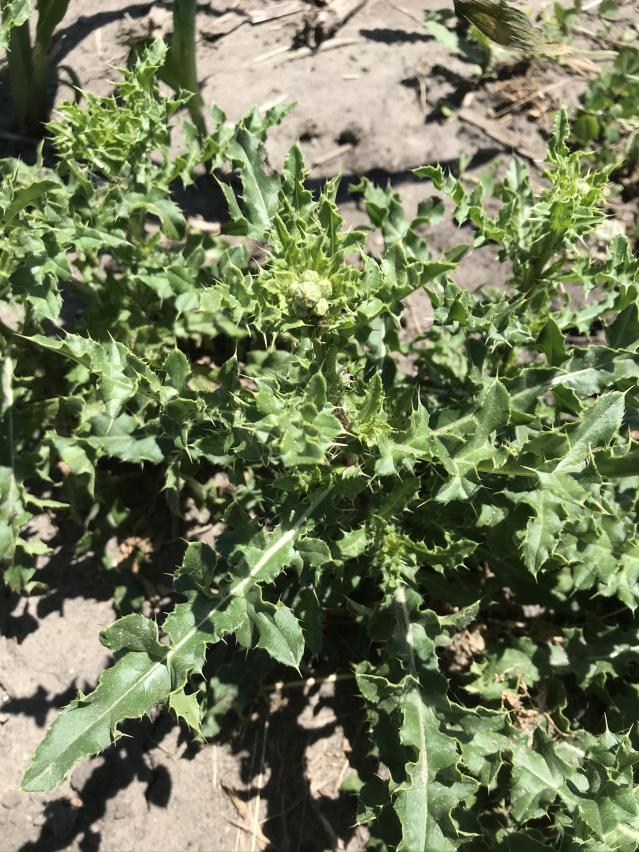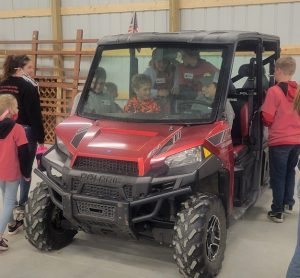CLICK HERE for the latest market quotes from the Iowa Agribusiness Network!
CLICK HERE for the latest market quotes from the Brownfield Ag News Network!
CLICK HERE for the latest market quotes from the Iowa Agribusiness Network!
CLICK HERE for the latest market quotes from the Brownfield Ag News Network!
(Radio Iowa) – Forecasters say Iowa’s rollercoaster weather will see temperatures rocket back into the 80s and 90s this week after frosty lows dropped into the 30s just last week. The return to summery heat means more worries about drought as the recent rains weren’t enough to reverse months of dry weather. Adam Hartman, a meteorologist with the Climate Prediction Center, says the ground remains very arid, despite several downpours. “When you have heavy rainfall in a very short period of time, it doesn’t allow the soils enough time to absorb that moisture,” Hartman says, “Instead you actually get more runoff than absorption.”
The drought started last summer and the latest U-S Drought Monitor map shows most of Iowa remains in the categories of abnormally dry, moderate drought or extreme drought. Meteorologist Dennis Todey, director of the U-S-D-A’s Midwest Climate Hub in Ames, says even with the May rains, there just isn’t enough moisture in the soil for plants to thrive. “We are at greater risk of having problems with crops and other plants as the season goes along,” Todey says, “because there’s not as much moisture available for the crops to be able to grow.”
It’s hard to say how long the drought will continue, as summer often brings localized thunderstorms which can be difficult to forecast. Todey says long-term drought could create problems for water quality in Iowa. The amount of water flowing in the Raccoon River, the main source of drinking water for Iowa’s largest city, dropped down about 90-percent from normal during May.
(reporting by Katie Peikes, Iowa Public Radio)
(Report from Cass County/ISU Extension) – Canada thistle has been a consistent threat to crop production and perennial habitats since its introduction to the state in the late 1800s. Canada thistle is commonly found in crop fields, pastures, hayfields, CRP, and other full sun habitats. While fall is typically the best time to manage this weed species, late spring, when Canada thistle plants are in the bud or early bloom stage, is a close second for providing consistent herbicidal control. Now is time to be treating Canada thistle in pastures, hayfields, and other non-crop areas if you don’t want to wait for fall.

Canada thistle in early bud stage. Image by Meaghan Anderson.
Identification
Canada thistle is a perennial that spreads by lateral roots and seed. New plants commonly develop from lateral roots in early spring and infestations can spread quickly due to large investment in underground structures. Aboveground, Canada thistle plants usually grow 2-3 feet tall. Leaves are spiny and vary from having shallow or no lobes on early growth to deep lobes on later developed leaves. It can be distinguished from common biennial thistles using several characteristics, depending on whether plants are in vegetative or reproductive stages. Bob Hartzler recorded several nice videos on identifying 3 biennial thistles (bull thistle, musk thistle, field thistle) and Canada thistle last year. Canada thistle flowers are vase-shaped and smaller than other thistles, about ½ inch in diameter. Flowers vary from purple to pink to pale lavender, almost white.
Control with herbicides
Herbicide treatments during the bud to flower stage using products containing clopyralid (herbicide group (HG) 4), aminopyralid (HG 4), or glyphosate (HG 9) can be effective at reducing population size. Glyphosate should only be used for spot treatments unless a non-selective herbicide is desirable for the location. HG 4 products like clopyralid and aminopyralid are effective options for areas with desirable grass species but will affect most broadleaf species they contact.
While spot treatments are effective on individual stems and small infestations, larger infestations may require broadcast treatments. Use caution near desirable plants to avoid injury and carefully inspect herbicide labels prior to use to determine the best product for the area. Precautions should be taken to minimize off-target movement that may result in injury to desirable plants. Check labels for any restrictions that may pertain to use near water resources and for grazing/haying of treated areas.
Alternative control options
Regular mowing, possibly 6 or more times per growing season for several years, may help control Canada thistle in pastures, hayfields, or non-crop areas that can tolerate it. Management with fewer mowing events per season is less likely to control Canada thistle but may contain or slow spread of infestations. Purdue University has a thorough document on Control of Canada Thistle in CRP and Other Noncrop Acreage that describes mowing and other non-chemical strategies for managing Canada thistle.
Canada thistle is perhaps the poster child for a weed that requires a long-term commitment for effective control. In areas with established populations, the aboveground growth represents only a small percentage of the actual plant mass. The majority of biomass will be below ground, thus requiring significant fortitude to eradicate the infestation. Follow up efforts are required to control plants that survive earlier treatments and plants that continue to emerge from rootstocks.
By Aaron Saeugling/ ISUEO Field Agronomist, Lewis, IA
(Des Moines) – A major meat processing company in Iowa suffered a cyberattack over the weekend. According to KCCI, JBS USA confirms the attack hit some of its North American and Australian IT systems Sunday. The company suspended all systems that were affected. It’s not clear if the attack is having any kind of effect on production since the company’s backup systems were not hit.
JBS says it is not aware of any evidence that would indicate its data has been compromised. Company officials say there may be delays in some transactions. JBS has processing plants in Marshalltown, Ottumwa and Council Bluffs.
(Radio Iowa) – The passport program that offers prizes when you visit state parks is back this year. Iowa Tourism Office spokesperson, Jessica O’Riley, says they launched the program last year to celebrate the 100th anniversary of the state parks. “It was such a phenomenal success that we thought we need to bring it back this year,” O’Riley says. “We had nearly 30-thousand check-ins at parks across the state with last year’s version. So now we have relaunched it with new prizes to entice people to get outdoors and explore again this year.”
The Iowa Department of Natural Resources is partnering with the Tourism Office on the program. “If you check into ten of the 62 participating state parks — the first one-thousand people to do that — win a state park passport t-shirt. A highly coveted t-shirt I am sure,” O’Riley says. The prizes ramp up as your visits increase. She says if you check into 30 parks you can win one of four activity trackers and then your check-ins each month qualify you to win a larger prize, such as a paddleboard and watersport accessory in June.
You can find out more about the passport by visiting traveliowa.com/passport or by texting PARKS to 515-531-5995.
(Radio Iowa) – An Iowa State University study finds a recent federal court decision forcing the line speeds at meat processing plants to slow down could result in a two-and-a-half percent loss in pork packing capacity nationwide. I-S-U economist Dermot Hayes says without any changes, the ruling will lead to a cut of more than 80-million dollars in income for small pork producers. “We were expecting those plants to be at capacity this fall so those extra hogs are going to have to find a home,” Hayes says. “Packers will have to cancel contracts with producers and push those hogs out and they’ll be transported a couple hundred miles to a plant that is willing to take those hogs, but of course, at a discount.”
Hayes says the new regulations go into effect July 1st, but plants won’t start reaching capacity until September, October or November — which is when the forced slowdowns will hit. “Four or five of the plants have been running at these line speeds for 20 years,” Hayes says, “so it’s not a short-term decision that caused this. It’s one of those laws of unintended consequences. We’ll see it this fall when we traditionally get the most hogs going through the pipeline.” Hayes says if the agency plans to appeal the court’s decision, it’ll need to act quickly.
“The decision that the U.S. Department of Agriculture made to allow higher line speeds under the Clinton administration, the judge just didn’t think they had done a good enough job documenting the impact on worker safety,” Hayes says. “One outcome would be for the USDA to appeal and ask for some time to document the impact on worker safety, if any.”
The National Pork Producers Council is urging the U-S-D-A to appeal the decision. N-P-P-C president Jen Sorenson says the lives of many hog farmers will be upended if the ruling takes effect.
DES MOINES – On Thursday, Iowa Gov. Kim Reynolds signed a new Public Health Disaster proclamation that extends critical regulatory relief for an additional 30 days to those on the frontlines of COVID19 recovery.
The proclamation also continues to extend the waiver on transportation restrictions for overweight loads.
The proclamation can be found online here.
(Radio Iowa) – Iowa’s governor has joined with the governors of Montana, Oklahoma, Nebraska and the Dakotas in calling for a public update on any federal investigation of the meatpacking industry.
Governor Kim Reynolds and the five other governors have sent a letter to U.S. Attorney General Merrick Garland. The group says decades of consolidation have led to anticompetitive behavior from the four major meatpackers that threatens the existence of independent cattle producers. Tyson, J-B-S, Cargill and National Beef controll about 80 percent of the beef market. Reports from June of last year indicated the Trump Administration’s Department of Justice had initiated a civil investigation of those meatpackers. The Republican governors, including Reynolds, are asking the Biden Administration’s Justice Department to provide regular updates to the public, where appropriate.
President Biden has appointed a commissioner to the Federal Trade Commission who is well known for her criticism of anti-competitive practices in the poultry industry. The F-T-C also has the power to file lawsuits over monopolies.
(Radio Iowa) – Registration is now open for the Field To Fork Deer Hunting Program which takes Iowans with zero hunting skills and teaches them to use a compound bow to hunt and kill white-tailed deer. Jamie Cook, the program’s coordinator with the Iowa Department of Natural Resources, says students will also learn how to field dress the animal and cook venison. Cook notes, it takes a commitment. “The program does go on about six months,” Cook says. “What we’ve learned over time is, with hunting, being a pretty serious life skill, it takes a while to develop and in order to really get to the point where you enjoy it and you’re willing to build confidence, it does take that amount of time.”
For Iowans who want to tackle the challenge of bow hunting as a means of sourcing their own protein or red meat, Cook says the program provides the opportunity to learn what it takes to do it all yourself. “Beginning this summer, our participants will start shooting at a local archery range,” Cook says. “They’ll get some help from professional and hobby archers that can give them tips to increase their proficiency. During the summer we’ll also be sending them some books to read, some chapters, some weekly homework assignments.”
There will also be a series of videos to watch that focus on bow hunting skills and hunting deer in particular. As summer progresses, students will learn basic strategies for hunting deer including the proper equipment, where to hunt, safe shooting practices and tree stand placement. “As we get close to deer season in the fall, we’ll have a couple of workshop days or field days where they’ll come out and learn to do a blood trail, they’ll learn to shoot from a tree stand,” Cook says. “We’ll make sure their proficiency is good, and by that point we’ll also have a mentor available for them, and from there, they get to hunt on their own schedules.”
The course will be hosted in Adel, Altoona and Council Bluffs and is geared for participants 21 and older. The cost is $238.50 which includes tags, licenses, books and archery loaner equipment. The program is part of a national effort to recruit, retain and reactivate hunters due to the overall decline in hunting and outdoor recreation.
To register: https://forms.gle/ACJQwij96BdGnw4g8
(Submitted by Guthrie County ISU Extension) – Each year the Guthrie County ISU Extension and Outreach has offered a Farm Safety Day to the third-grade youth in Guthrie County for over 20 years. This year is no different, it just included the fourth graders due to having to cancel the 2020 event because of the pandemic. This year we had youth from ACGC Schools, Coon Rapids Bayard Schools, and Panorama Schools attend our event. According to the National Children’s Center, every day about 33 children are injured in agriculture-related incidents.

 The topics and presenters this year were:
The topics and presenters this year were:
Guthrie County extension Program Director Krista Downing says “We were fortunate enough to have the Guthrie County Sheriff’s Department kick us off each morning with a discussion with the youth about being safe on the farm and giving real life examples of things they have seen around Guthrie County. We ended each day with a Gasoline Safety lesson from The Legacy of Christopher Allsup Foundation. After losing her 10-year old son to a gas can explosion in 2013, Christopher’s mother Jane Allsup, has made it her mission to raise awareness and to educate the public regarding the dangers of portable gasoline containers that do not conform to ASTM consumer safety standards.”
The event is hosted by the Guthrie County ISU Extension & Outreach office. The event this year was co-sponsored by Guthrie County Community Foundation, ACGC FFA Chapter, Guthrie County Farm Bureau, Guthrie County Corn Growers, and Guthrie County Fairboard.
And you thought this year’s Best Burger Contest was over! The Iowa Beef Industry Council (IBIC) and New York Beef Council (NYBC) are putting their state’s best burgers to the test in a battle for bragging rights of the ultimate best burger. The IBIC says consumers have a chance to cast their vote for either Iowa’s Bino Burger or New York’s Hot & Smokey Candied Bacon Burger. The voting is open now through 11:59-p.m. May 30, 2021. The 2021 Iowa’s Best Burger was recently awarded May 3rd, to Bambino’s in Ossian.
The Bino Burger has been referenced as “the burger-lovers burger”, featuring a juicy, all-beef burger patty topped with lettuce, tomato, pickle, and onion. Customers can customize their burger from that foundation with bacon, eggs, onion rings, hash browns, and more. Selection of Iowa’s Best Burger was obtained through a phase of public voting. For a month, burger lovers went online and voted for their favorite Iowa burger joint. At the end of the month, the ten restaurants with the most votes were declared the “Top 10”. From there, three anonymous judges visited each of the restaurants, scoring the burger patties based on taste, doneness, and presentation.
 On the Northeastern side of the country, Ale ‘n’ Angus Pub was named the Best New York Burger on May 10. The downtown Syracuse eatery earned the honor with their Hot & Smokey Candied Bacon Burger featuring an 8-ounce Angus beef patty with jack cheese, candied bacon, house-made onion spread, chipotle mayonnaise, and honey. Selection of New York’s final four were obtained through public nominations and online voting, with a team of judges choosing the overall winner following a cookoff.
On the Northeastern side of the country, Ale ‘n’ Angus Pub was named the Best New York Burger on May 10. The downtown Syracuse eatery earned the honor with their Hot & Smokey Candied Bacon Burger featuring an 8-ounce Angus beef patty with jack cheese, candied bacon, house-made onion spread, chipotle mayonnaise, and honey. Selection of New York’s final four were obtained through public nominations and online voting, with a team of judges choosing the overall winner following a cookoff.
Compared to Iowa, New York represents a dense population center that is further removed from how cattle are raised. In an effort to help bridge the gap between beef production in the Midwest and Northeastern consumers, the Best New York Burger Contest is made possible with funding from IBIC. Iowa’s Best Burger Contest is sponsored by IBIC through the Iowa State Beef Checkoff and the Iowa Cattlemen’s Association. Restaurants are an important and valuable partner of the beef industry.
Iowans to cast their vote for Bambino’s Bino Burger using the online nomination form on the IBIC website, or the Iowa Beef Council Facebook page. Remember, the nomination period will close at 11:59 p.m. on May 30, 2021. Officials say COVID-19 restrictions are changing and now is the time to go out and support your local restaurants. Many restaurants in the state have dine-in and carry-out options to meet your needs. After a challenging year for many restaurants around the country, we encourage consumers to rally their support behind restaurant owners and Iowa’s beef farmers by choosing to order a real-beef burger on May 28 to celebrate National Beef Burger Day!